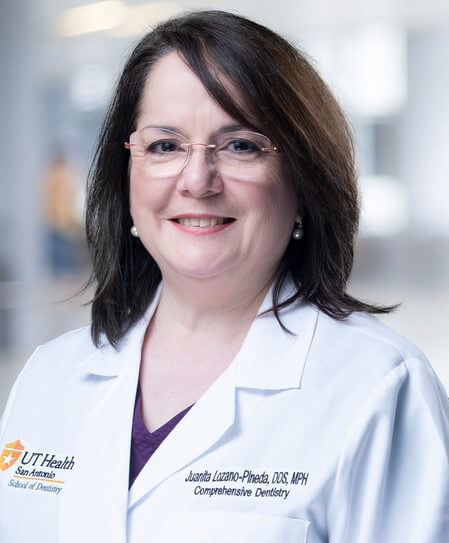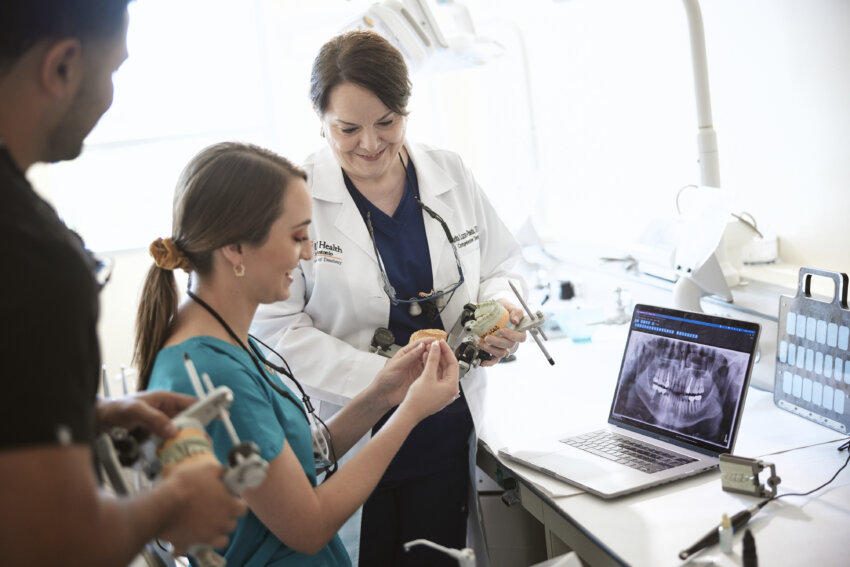Contact: Steven Lee, 210-450-3823, lees22@uthscsa.edu
SAN ANTONIO – A Hispanic Center of Excellence at the UT Health San Antonio School of Dentistry is filling a need for dental professionals in underserved counties of Texas by recruiting students from those areas, many of whom return to practice.
Recruitment and mentoring programs of the initiative have led to an increase in under-represented minority applicants and enrollees, who now comprise more than 30% of the dental school’s students.
And the school’s graduates now account for 33% of practicing dentists in underserved counties of South Texas.
“We are actively recruiting students from dentally underserved areas of Central and South Texas and then supporting their success through programs that allow them to return to their communities to work,” said Juanita Lozano-Pineda, DDS, MPH, associate dean for external affairs at the UT Health San Antonio School of Dentistry, and director of its Hispanic Center of Excellence.

The center is funded by a grant from the Health Resources and Services Administration of the U.S. Department of Health and Human Services, specifically to recruit students from counties with health-profession shortages and ultimately fill the need for dental providers there.
The grant provides resources for the UT Health San Antonio dental school to develop and enhance its pipeline programs, such as Building Our Leaders in Dentistry (BOLD), which helps recruit and mentor high school and college students to careers in the field.
Students are introduced to dentistry with presentations and hand-skills activities that include indirect mirror tracing, wire bending and tooth preparations with the use of portable equipment.
This is followed by a three-week summer enrichment program for pre-dental students who are underrepresented in dentistry. The Learning Enhancement for Achievement in Dentistry (LEAD) program is comprised of seven parts:
- LEAD 1-3 are for pre-dental, college-level, students. The aim of these summer sessions is to help build more competitive underrepresented minority dental applicants. The programs continue while these students are in dental school in a concentrated effort to retain them.
- LEAD 4 helps orient students to their first year of dental school while allowing them to build a supportive network that will help them in their transition to dental school.
- LEAD 5-6 include activities such as hand-skill development for pre-clinical restorative procedures and an introduction to clinic processes and patient care.
- LEAD 7 has participants providing clinical services in underserved communities, while offering additional support for retention and successful graduation.
More than 80 students participate in LEAD 1-7 each year.
“And many of those students do return to underserved communities to practice after graduation,” Dr. Lozano-Pineda said. “Enhanced recruitment of students from the region and the combined years of clinical rotations to the underserved areas have really generated positive results.”
One former student of the program, Hevony Rodriguez, DDS, is making a difference in her hometown of Laredo, Texas, as the primary dentist for the underserved at a Gateway Community Health Center location.
“The Hispanic Center of Excellence was an integral part of my journey to becoming a dentist,” Dr. Rodriguez said. “With the help of the program, I was able to get the education and support I needed, and to bring those skills back to my hometown.
“I am thankful for the help I received,” she said, “and am hopeful that future students continue to have access to this program.”
Demand for their services is only expected to grow.
Within the next 10 years, 33.5% of dentists practicing in South Texas counties with health-profession shortages will be of retirement age. The Hispanic Center of Excellence continues to recruit and mentor future dental professionals from the area and is poised to help stem any health-provider disparities.
To learn more about the program, go to https://dental.uthscsa.edu/LEAD/, email HCOE@uthscsa.edu or contact Dr. Lozano-Pineda at 210-567-3173.
The University of Texas Health Science Center at San Antonio, also referred to as UT Health San Antonio, is one of the country’s leading health sciences universities and is designated as a Hispanic-Serving Institution by the U.S. Department of Education. With missions of teaching, research, patient care and community engagement, its schools of medicine, nursing, dentistry, health professions and graduate biomedical sciences have graduated 39,700 alumni who are leading change, advancing their fields, and renewing hope for patients and their families throughout South Texas and the world. To learn about the many ways “We make lives better®,” visit http://www.uthscsa.edu.
Stay connected with The University of Texas Health Science Center at San Antonio on Facebook, Twitter, LinkedIn, Instagram and YouTube.
To see how we are battling COVID-19, read inspiring stories on Impact.


